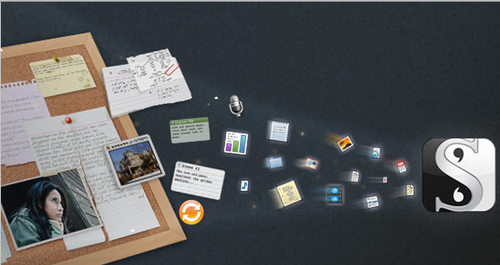Letters & Light and Literature & Latte: The Scrivener Edition

Each year, we interrogate one or two NaNoWriMo corporate sponsors. It’s our way of saying thanks for the vital funding that our sponsors contribute to NaNoWriMo and the Young Writers Program. Today, we asked Ioa Petra’ka some hard-hitting questions about Portlandia, writing parties, and Scrivener pro-tips.
Remember to check out Scrivener’s offers for Wrimos on the NaNo site, and in the forums!
What inspired you to first take part in the delightfully masochistic NaNoWriMo? Do you enjoy inflicting pain upon yourself?
I was half mad back then, and so many of my choices were not based upon the sound principles of reason, logic and prudence. Thankfully, I do not regret madness: it has led to many wonderful and painful things. Impulsiveness aside, I wanted to challenge myself with the long-form story format.
Up until that point I had written exclusively in the short story format, which is still something I feel more at home with. I like short, snappy little ideas. Those can be difficult to wring out, and out, and out until they are hundreds of pages long. So it is still definitely this challenge that brings me back to the project, going on ten years now.
You started working at Scrivener after “meeting” them in NaNoWriMo’s forums. Do you tell people that you now make a living off of your novel writing?
I’ve never quite thought of it that way, but you know, I could go around saying that now! In general, it’s been a huge pleasure to be able to work for the writing community at large, with a group of people that are similarly minded. When I was growing up, I wanted to be a writer, and while I still consider myself to be a writer, I’m also happy to be an enabler. That’s always been the important part of my life: forwarding the art of writing in culture. Whether I’m doing that with my own words, or making it easier for everyone else to do so, it makes no difference to me.
Since you author the Scrivener user manual, you must know more about Scrivener than anyone else.
This is sadly probably true, but the line is thinner than you might think! Over the years, a number of authors and educators have set up web sites to help people learn Scrivener, either through video tutorials, blogs or even published books. So there is a fantastic group of helpful and knowledgeable people that together create the Scrivener community.
Do you write the user manual in NaNoWriMo style—with crazy bursts of typing, telling your inner editor to go away?
I would love to say that I do not, that I carefully plan everything out and meticulously cover every angle of the software when describing features. But the reality of writing software manuals is that they are never done, software changes rapidly, and it can often take quite a bit of work to explain an unfamiliar concept of the software.
There are many aspects of this that are more creative than I had originally presumed, and while I am glad for that, it can be rather time-intensive. This inevitably means that there is a lot more writing than there is editing going on, and I weep at all of the mistakes and typos that surely abound.
What is your favorite Scrivener feature that many don’t know about?
I would say the ability to cut through your manuscript and look at it from non-linear angles without sacrificing the standard text editing experience. That probably all sounds like voodoo when I put it like that.
Scrivener basically gives you a bunch of little tools like colored cards and search tools and corkboards and then lets you come up with neat ways of grasping the entirety of your work with them in that way that feels fluid and natural—in ways that can adapt to how you prefer to work as a writer, rather than trying to shoehorn everyone and everything into a particular methodology of strict features.
If you were to write a pep talk to Wrimos that involved Scrivener, what would you focus on?
We all have so many different ways of writing that it can be difficult to provide universal advice like this. I guess one piece of advice I would have for people who are struggling with a scene: just jump past it. Put down a note to yourself as a comment or annotation and move on to something you already have words for. It’s easy to work this way when your whole book is a neat stack of topical items on the left side of the window that you can use to organize and navigate in your manuscript.
Portland has a rich literary history with Powell’s Books, Tin House, Ken Kesey—and Beezus and Ramona and Henry Huggins, of course. How has it influenced your writing?
Not only do we have a literary history, but we have a lot of readers as well. This town loves its books, probably because we all have to sit around indoors for eight months out of the year to avoid the rain. Of course there is Powell’s bookstore which will make just about anyone who loves books get a little weak in the knees whenever you step into it. The public library system is fantastic for a small city, opening up the world of literature and knowledge to anyone, no matter what the budget. So I think the thing that has been of greatest influence to me is the overall culture of books here.
They say a writer should read as much as they write, and living in a place that has books coming out of its ears can help make that goal a matter of second-nature. Most importantly, the NaNoWriMo community is huge here. Our parties are giant and our write-ins are well-populated and scattered all over the city; you could go write-in hopping every night if you wanted to and we challenge major cities to word wars. It’s great to see so many people working on their books and getting that novel out of their system and having a fun time with it.
It seems like NaNoWriMo should be included on an episode of Portlandia. Can you make that happen?
This is a fantastic idea. I’m picturing a bunch of harried writers arguing over the total ecological impact of using a computer to write vs. pen and paper. How many trees and beetles must die, how much mercury and lithium ion must we use? What is the most vegan way to write?
Final words of advice for Wrimos?
Something that has worked well for me is to have a block of time each day, preferably at the same time of day, that is all about NaNo—no exceptions. When I approach that time of day, I start going over the book in my mind. I like to write out of the house, and so as I’m walking to a coffee shop, I’ll just go over bits of prose in my mind or plot structures, and push out all of the worries and thoughts of the day. When I’m ready to open my laptop and start writing, I’m primed and ready to focus on just that.
This year I’ve been setting aside the mornings for writing. I won’t allow myself to do anything until I’m done writing for the day. Why allow myself the luxury of indulgences like eating, if I don’t have my 1,667 words!
 When Ioa Petra’ka isn’t working on the Scrivener user manual itself, he’s often answering questions about the software. He started out as a somewhat neurotically enthusiastic forum member in 2005, and in 2010, Literature & Latte reached a point where they could make his time spent there an official activity. He’s still pretty neurotic about it though. These days, he also works on the website and helps with software design for Scrivener and their new beast, Scapple. Given his love of literature & software, he couldn’t imagine a better job.
When Ioa Petra’ka isn’t working on the Scrivener user manual itself, he’s often answering questions about the software. He started out as a somewhat neurotically enthusiastic forum member in 2005, and in 2010, Literature & Latte reached a point where they could make his time spent there an official activity. He’s still pretty neurotic about it though. These days, he also works on the website and helps with software design for Scrivener and their new beast, Scapple. Given his love of literature & software, he couldn’t imagine a better job.
Photo courtesy of Literature & Latte.
Chris Baty's Blog
- Chris Baty's profile
- 62 followers



